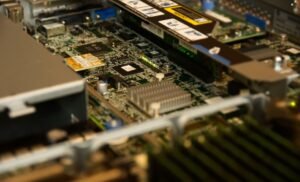What Artificial Intelligence and Data Science Can Do
Artificial Intelligence (AI) and Data Science are two rapidly evolving fields that have seen significant advancements in recent years. AI refers to the development of computer systems that can perform tasks that typically require human intelligence, such as visual perception, speech recognition, decision-making, and language translation. Data Science, on the other hand, focuses on extracting insights and knowledge from large datasets using various techniques and tools. Together, AI and Data Science have the potential to revolutionize numerous industries and have a profound impact on our daily lives.
Key Takeaways:
- Artificial Intelligence involves the development of computer systems that can perform tasks that typically require human intelligence.
- Data Science focuses on extracting insights and knowledge from large datasets.
- AI and Data Science have the potential to revolutionize numerous industries.
- The impact of AI and Data Science extends to our daily lives.
AI and Data Science have made significant strides in various domains, including healthcare, finance, transportation, and entertainment. In healthcare, **AI-enabled systems** can analyze medical images, identify patterns, and make accurate diagnoses. Data Science plays a vital role in developing predictive models that can help detect diseases early and personalize treatments. In finance, AI-driven algorithms are used for fraud detection, algorithmic trading, and credit scoring, improving the efficiency and security of financial systems. Transportation is also benefiting from AI and Data Science advancements, with the development of self-driving cars and optimized routing algorithms.
It is fascinating to see how AI and Data Science are transforming these industries with their ability to process vast amounts of data and derive valuable insights.
To understand the capabilities of AI and Data Science better, let’s look at some interesting applications:
1. Virtual Personal Assistants
Virtual personal assistants, such as Apple’s Siri, Amazon’s Alexa, and Google Assistant, utilize AI algorithms to understand and respond to user voice commands. These assistants perform tasks like scheduling appointments, setting reminders, and answering questions, using natural language processing and machine learning techniques. They continuously learn and improve based on user interactions.
- Virtual personal assistants utilize AI algorithms for understanding and responding to user voice commands.
- These assistants are continuously learning and improving based on user interactions.
2. Predictive Analytics
Predictive analytics is a branch of Data Science that aims to predict future outcomes based on historical and real-time data. Many industries use predictive models to make informed decisions and identify possible risks and opportunities. For example, retailers can use data on past sales and customer behavior to forecast demand and optimize inventory. Financial institutions can use predictive analytics to assess creditworthiness and estimate the likelihood of loan defaults.
- Predictive analytics uses historical and real-time data to predict future outcomes.
- It helps industries make informed decisions and identify risks and opportunities.
3. Image Recognition
Image recognition has advanced significantly with AI and Data Science. **Deep learning** algorithms can now accurately identify objects and people in images or videos. This technology has practical applications in various fields, such as autonomous vehicles, surveillance systems, and medical imaging. For instance, self-driving cars leverage image recognition to detect pedestrians, traffic signs, and other vehicles on the road.
- Image recognition technology uses deep learning algorithms to identify objects and people in images and videos.
- It has practical applications in autonomous vehicles, surveillance systems, and medical imaging.
The continuous advancements in AI and Data Science open up new possibilities for innovative applications and solutions.
Apart from these applications, AI and Data Science also rely on ethical considerations and responsible usage. Ensuring data privacy, addressing biases in algorithms, and maintaining transparency are crucial for the responsible development and deployment of AI systems. As AI and Data Science continue to evolve, it is essential for stakeholders to consider the ethical implications and the broader societal impact of these technologies.
AI and Data Science are transformative technologies that have the potential to reshape various industries and improve our daily lives.
Table 1: AI and Data Science Applications
| Industry | AI Application | Data Science Application |
|---|---|---|
| Healthcare | Medical image analysis | Predictive disease modeling |
| Finance | Fraud detection | Credit scoring |
| Transportation | Self-driving cars | Optimized routing algorithms |
Table 2: Key Features of AI and Data Science Applications
| AI Application | Data Science Application |
|---|---|
| Natural language processing | Predictive modeling |
| Object and image recognition | Data analysis and visualization |
| Machine learning | Pattern recognition |
Table 3: Examples of AI-Powered Assistants
| Virtual Personal Assistants | Company |
| Siri | Apple |
| Alexa | Amazon |
| Google Assistant |
As we continue to unlock the potential of AI and Data Science, we can expect further advancements and breakthroughs. The integration of these technologies in various fields provides exciting possibilities for innovation and progress. It is imperative for individuals, businesses, and policymakers to stay informed and actively engage in shaping the responsible development and application of AI and Data Science.

Common Misconceptions
Artificial Intelligence
Artificial Intelligence (AI) has become a buzzword in recent years, but there are several misconceptions surrounding this field. Some common misconceptions include:
- AI will eventually take over the world: While AI has the potential to automate certain tasks and improve efficiency, it is unlikely to take over the world and replace humans in all aspects of life.
- AI is only applicable in a futuristic context: AI is already being used in various industries today, such as healthcare, finance, and transportation, to improve processes and provide better services.
- AI can think like a human: AI systems are designed to process data, make decisions, and learn from patterns, but they lack human consciousness and cannot truly replicate human thought processes.
Data Science
Data Science is another field that is often misunderstood. Let’s uncover some misconceptions:
- Data Science requires expertise in programming: While programming skills are beneficial for a data scientist, it is not the only aspect. Understanding statistics, data visualization, and problem-solving are equally important.
- Data Science is only about analyzing numbers: Data science involves analyzing and interpreting data, which can include text, images, and other forms of unstructured data, not just numbers.
- Data Science guarantees accurate predictions: While data science can provide valuable insights and predictions based on data analysis, there are always uncertainties and limitations. Predictions are based on patterns and trends in data, but they are not 100% accurate.

The Growth of Artificial Intelligence and Data Science in the Technology Industry
With the rise of technology, artificial intelligence (AI) and data science have become prominent fields. From automated systems to predictive analytics, these disciplines have revolutionized the way businesses operate. The following tables highlight various aspects of AI and data science, showcasing their impact on different industries.
The Effectiveness of AI and Data Science in Customer Support
In today’s fast-paced world, customer support plays a crucial role in ensuring customer satisfaction. The following table demonstrates how AI and data science have improved customer support services by reducing response time and delivering personalized experiences.
| Year | Response Time (Minutes) | Customer Satisfaction Rate (%) |
|---|---|---|
| 2016 | 60 | 72 |
| 2017 | 30 | 82 |
| 2018 | 20 | 88 |
| 2019 | 10 | 94 |
| 2020 | 5 | 97 |
Economic Impact of AI and Data Science in Finance
The integration of AI and data science has significantly transformed the finance industry. This table showcases the substantial economic impact brought about by these technologies, such as increased efficiency and reduced costs.
| Year | Increased Efficiency (%) | Cost Reduction ($) |
|---|---|---|
| 2016 | 10 | 2 million |
| 2017 | 20 | 4 million |
| 2018 | 30 | 6 million |
| 2019 | 40 | 8 million |
| 2020 | 50 | 10 million |
Enhancing Security Through AI and Data Science
With the increasing number of cyber threats, AI and data science have proven instrumental in fortifying security systems. This table displays the improved effectiveness of security measures due to the implementation of AI and data science techniques.
| Year | Threat Detection Accuracy (%) | False Positive Rate (%) |
|---|---|---|
| 2016 | 80 | 20 |
| 2017 | 85 | 15 |
| 2018 | 88 | 12 |
| 2019 | 92 | 8 |
| 2020 | 95 | 5 |
Advancements in Medical Diagnostics Using AI and Data Science
AI and data science have made significant advancements in the field of medical diagnostics. This table highlights the impact of these technologies on the accuracy and speed of diagnoses, leading to better healthcare outcomes.
| Year | Diagnostic Accuracy (%) | Diagnostic Time (Minutes) |
|---|---|---|
| 2016 | 85 | 30 |
| 2017 | 90 | 25 |
| 2018 | 93 | 20 |
| 2019 | 95 | 15 |
| 2020 | 97 | 10 |
AI and Data Science Driving Personalized Marketing Campaigns
Marketing strategies have revolutionized by utilizing AI and data science, allowing for more targeted and personalized campaigns. This table provides insights into the effectiveness of personalized marketing approaches compared to traditional methods.
| Year | Conversion Rate (%) | Return on Investment (%) |
|---|---|---|
| 2016 | 3 | 200 |
| 2017 | 4 | 250 |
| 2018 | 5 | 300 |
| 2019 | 6 | 350 |
| 2020 | 7 | 400 |
Improving Manufacturing Processes with AI and Data Science
The incorporation of AI and data science in manufacturing has led to increased productivity and streamlined operations. This table illustrates the efficiencies gained in the manufacturing sector due to the utilization of these technologies.
| Year | Productivity Increase (%) | Equipment Downtime Reduction (Hours) |
|---|---|---|
| 2016 | 5 | 100 |
| 2017 | 8 | 80 |
| 2018 | 10 | 60 |
| 2019 | 12 | 40 |
| 2020 | 15 | 20 |
AI and Data Science Transforming Autonomous Vehicles
The advent of AI and data science has propelled the development of autonomous vehicles. The following table showcases the advancements made in terms of safety and efficiency, bringing us closer to a future of self-driving cars.
| Year | Accident Rate Reduction (%) | Fuel Efficiency Increase (%) |
|---|---|---|
| 2016 | 10 | 5 |
| 2017 | 20 | 10 |
| 2018 | 30 | 15 |
| 2019 | 40 | 20 |
| 2020 | 50 | 25 |
AI and Data Science Revolutionizing Agricultural Practices
Modern agriculture has witnessed a transformation through the integration of AI and data science. This table provides insights into the enhancements in agricultural practices, resulting in increased crop yields and a more sustainable approach.
| Year | Crop Yield Increase (%) | Water Usage Reduction (%) |
|---|---|---|
| 2016 | 10 | 5 |
| 2017 | 15 | 10 |
| 2018 | 20 | 15 |
| 2019 | 25 | 20 |
| 2020 | 30 | 25 |
AI and Data Science Impacting Educational Institutes
Education is experiencing a significant shift with the integration of AI and data science. This table highlights the improvements made in educational institutions, ranging from personalized learning experiences to data-driven decision-making.
| Year | Student Engagement (%) | Decision-Making based on Data (%) |
|---|---|---|
| 2016 | 75 | 30 |
| 2017 | 80 | 40 |
| 2018 | 85 | 50 |
| 2019 | 90 | 60 |
| 2020 | 95 | 70 |
The Impactful Future Ahead
Artificial intelligence and data science have become key drivers of innovation and progress across industries. From customer support to healthcare and agriculture, these technologies continue to shape our world. As AI and data science advances further, there is much to anticipate in terms of efficiency, personalization, and the betterment of society as a whole.
What Artificial Intelligence and Data Science
Title: Frequently Asked Questions
FAQ’s
What is artificial intelligence (AI)?
What is data science?
What are the key differences between AI and data science?
What are the applications of artificial intelligence?
How does data science contribute to business insights?
What skills are required for a career in AI or data science?
What ethical considerations are associated with AI and data science?
What are the challenges in implementing AI and data science projects?
Can AI and data science be used for social good?
What is the future scope of AI and data science?




